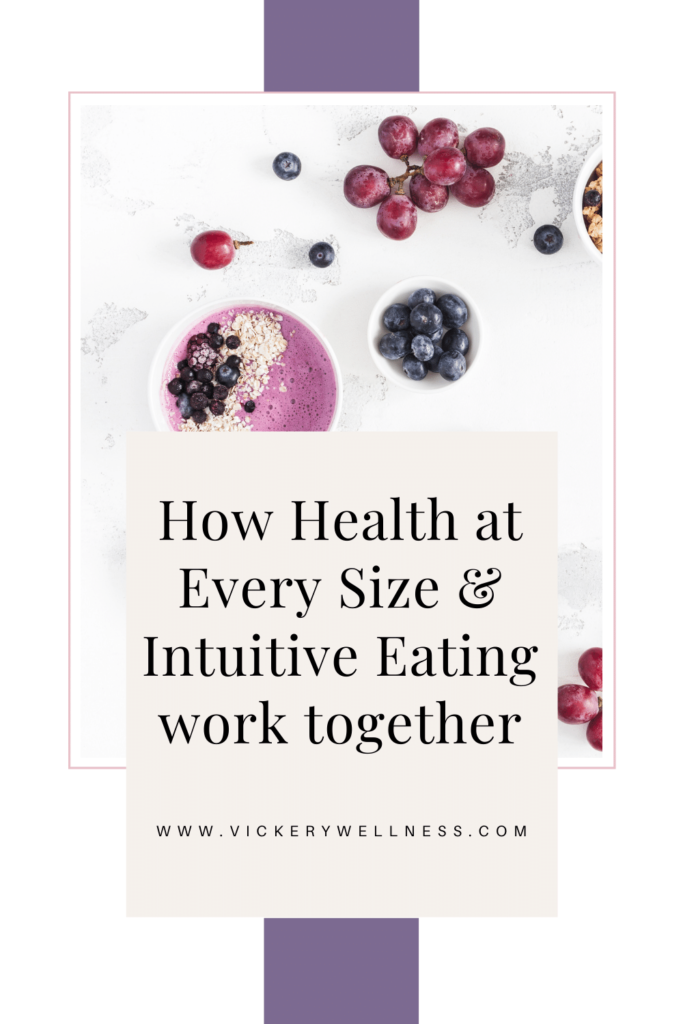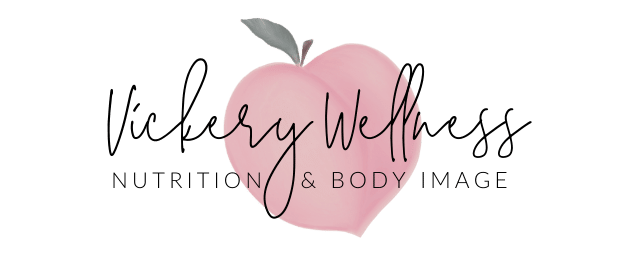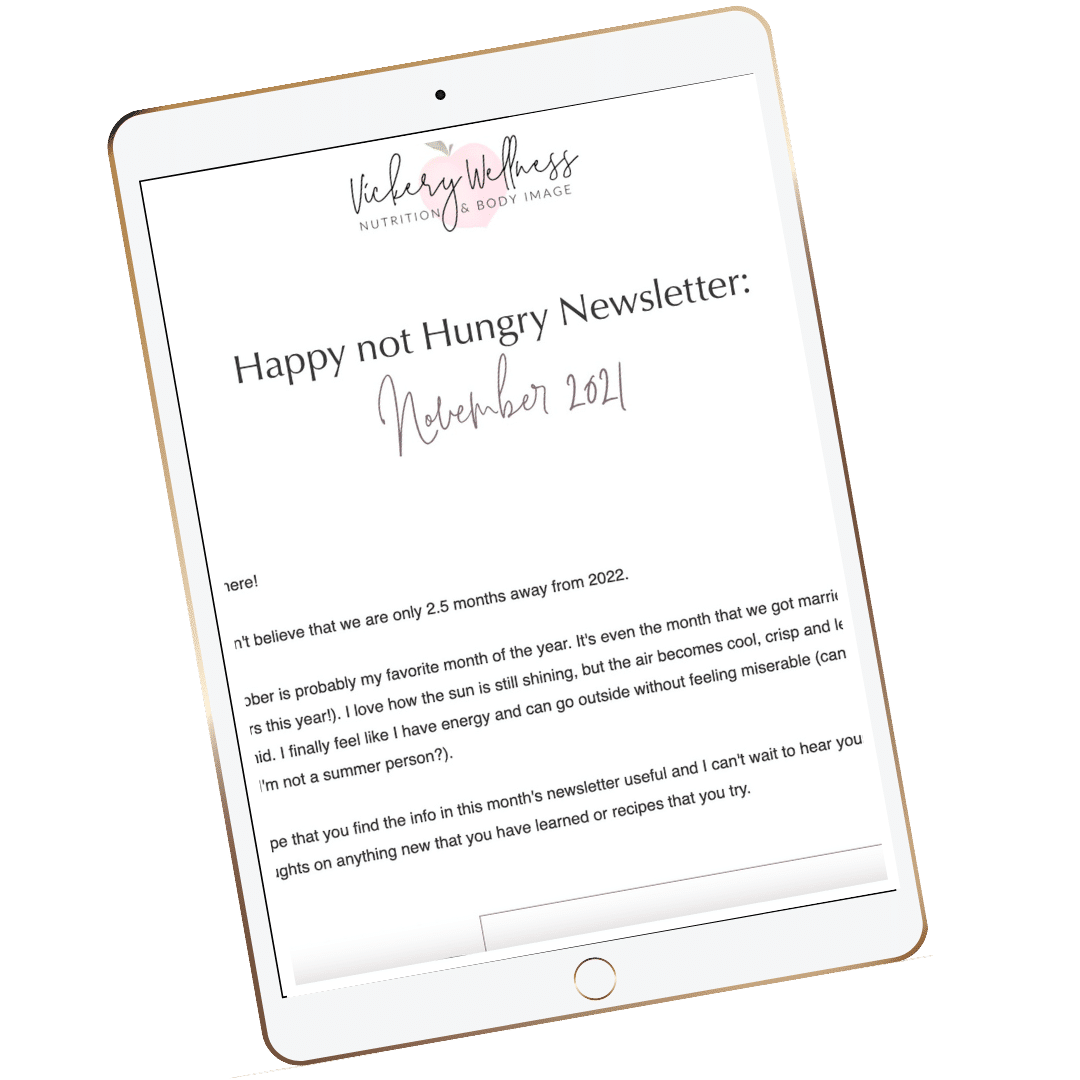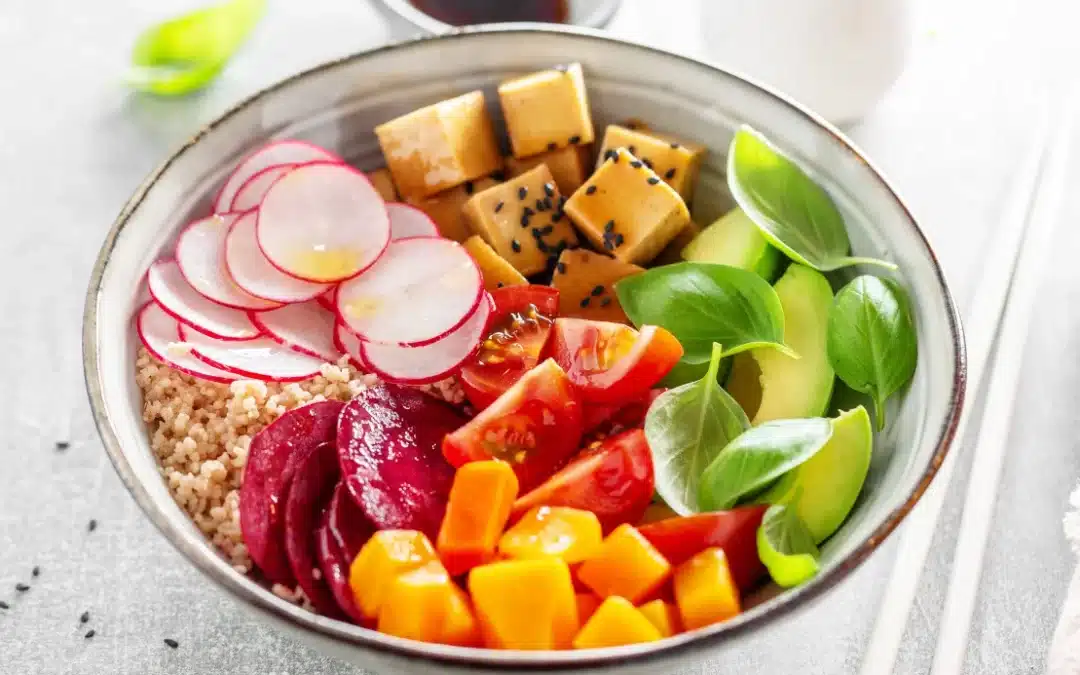Have you ever wondered what the difference is between Intuitive Eating and Health at Every Size? Or maybe you just want to learn more about both of these topics? In this post, I will cover these two approaches and discuss how Intuitive Eating and Health at Every Size work together!
INTUITIVE EATING
Did you know that there IS a way to stop dieting, not obsess about food, and make your physical and mental wellbeing a priority?
It is called “Intuitive Eating” and it is definitely not a weight loss program. Instead, it is a way to get back in tune with your body and break free from all of the “food rules” we have learned over the years.
Intuitive Eating teaches us that weight should not be the primary measure of our health, while also inviting you to eat the foods you WANT when you are hungry—and stop eating when you feel full. This is not just a ‘hunger and fullness diet.’ And it may feel scary and like you will do a “free for all” and eat how much you want of whatever you want whenever you want it. But, the core of Intuitive Eating is more about getting back in tune with your body and showing it the respect it deserves
Eating intuitively means being curious about what and why you want to eat something, and then enjoying it without judgment. [Yes, without judgment!] It is about trusting your body’s innate wisdom without influence from outside of yourself. It is about removing the labels of “good” or “bad” from food and ditching the guilt or pride about eating a certain way. It is about accepting food—and our bodies—as the amazing wonder that they really are and a belief that there truly is no “right” or “wrong” way to eat.
I reviewed the 10 principles of Intuitive Eating in this previous post. But, just to be sure, let’s review them here as well.
Two dietitians created this framework (Evelyn Tribole and Elyse Resch) and it includes these 10 principles:
1 – Reject the diet mentality
Ditch diets that give the false hope of losing weight quickly, easily, and permanently. You are not a failure for every time a diet stopped working and you gained the weight back. Until you break free from the hope that there’s a new diet around the corner, you cannot fully embrace intuitive eating.
2 – Honor your hunger
Your body needs adequate energy and nutrition. Keep yourself fed to prevent excessive hunger. By honoring the first signal of hunger you can start rebuilding trust in yourself and food.
3 – Make peace with food
Stop fighting with food and give yourself unconditional permission to eat. Stop fostering intense feelings of deprivation by denying yourself a particular food, as these can lead to cravings and bingeing. You don’t want your “giving in” to lead to overwhelming guilt.
4 – Challenge the food police
Confront the thoughts that you as a person are “good” or “bad” based on what and how much you eat. Diet culture has created unreasonable rules. The food police are the negative, hopeless, or guilty thoughts that you can chase away.
5 – Discover the satisfaction factor
Pleasure and satisfaction are some of the basic gifts of existence. By allowing yourself to feel these when you eat, you can enjoy feeling content and fulfilled. When you do this, you will be able to identify the feeling of “enoughness.”
6 – Feel your fullness
Trust that you will give yourself the foods you desire. Pause in the middle of eating and ask how the food tastes. Listen for the signals that you’re not hungry anymore. Respect when you become comfortably full.
7 – Cope with your emotions with kindness
Restricting food can trigger a loss of control and feel like emotional eating. Be kind to yourself. Comfort and nurture yourself. Everyone feels anxiety, loneliness, boredom, and anger. Food won’t fix these feelings—it’s just a short-term distraction. Ultimately, you have to deal with the uncomfortable emotions.
8 – Respect your body
Everyone is genetically unique, whether it’s shoe size or body size. Respecting your body will help you feel better about who you are. Being unrealistic or overly critical of your shape or size makes it hard to reject the diet mentality.
9 – Movement—feel the difference
Feel the difference activity makes. Not militant or calorie-burning exercise, but simply moving your body. Focus on how energized it makes you feel.
10 – Honor your health—gentle nutrition
Choose foods that honor your tastebuds and health. Don’t focus on eating perfectly. One snack, meal, or day of eating won’t suddenly make you unhealthy or deficient in nutrients. Look at how you eat over time. Choose progress, not perfection.
THE SCIENCE – INTUITIVE EATING
If you are thinking, but aren’t you a Dietitian!? Why would you tell people to eat whatever they want? Well, it’s not that simple. Let’s look at some of the science.
Previous studies have shown that people who eat intuitively tend to have higher levels of body appreciation and improved mental health. They also found that those who eat intuitively typically have lower blood pressure, cholesterol levels, and inflammation.
In a review of eight studies, they compared “health, not weight loss” eating styles with conventional weight-loss diets. While they found no significant differences in heart disease risk factors between the two types of diets, they did find that body satisfaction and eating behavior improved more for people in the “health, not weight loss” groups.
Another review of 24 studies of female college students showed that those who eat intuitively experience less disordered eating, have a more positive body image, and greater emotional functioning.
Overall, there continues to be a growing amount of research that shows the benefits of intuitive eating on both physical and mental health.

How Intuitive Eating and Health at Every SizeⓇ (HAESⓇ) work together
The non-diet approach of intuitive eating fits within the concept that there can be health at every size. The idea behind Health at Every SizeⓇ is to be inclusive of all weights and de-emphasize weight as the main factor to assess someone’s health. The way someone’s body looks does not tell the whole story about their overall health and wellbeing. Instead, their habits and lifestyle are more important factors than simply their size and shape.
Like Intuitive Eating, the Health at Every Size aka HAESⓇ paradigm has several principles. They are weight inclusivity, health enhancement, respectful care, eating for well-being, and life-enhancing movement. These include accepting the diversity of body shapes, supporting equal access to health information and services, promoting eating based on hunger and satiety, working to end weight discrimination and bias, and encouraging enjoyable physical movement.
Also like Intuitive Eating, the focus of HAESⓇ is not on weight loss, but moving toward sustainable healthy habits.
According to HAESⓇ, the objective is to “advance social justice, create an inclusive and respectful community, and support people of all sizes in finding compassionate ways to take care of themselves.”
HAES COMMUNITY
Tips to become an intuitive eater
There are many things you can do to start eating more intuitively and ditch diet culture and “food rules.”
- Put aside your guilt for previous diets that have failed you. (You have not failed them and you are not bad for participating in them.)
- Stop focusing on finding or implementing diets that promise easy, permanent weight loss.
- Start noticing what it feels like in your body to be hungry and to be full.
- Eat when you’re physically hungry, not when the clock says it’s okay to eat.
- Ask yourself what type of food will satisfy you. (Remember, there aren’t “good” or “bad” foods and you don’t need to judge yourself for eating—or not eating—them.)
- Pay attention to and enjoy your food while you’re eating it (eat mindfully).
- Treat your body with dignity and respect—regardless of its size or shape.
- Move your body in a way that is enjoyable and see how that makes you feel.
- Remember that there is no such thing as perfection. Take it one moment at a time.
Focus on healthy behaviors, not the scale
Intuitive Eating helps to improve your relationship with food and your body and mind. It’s about challenging external rules and subconscious habits around eating. It also challenges feelings of guilt or shame associated with eating a certain way.
To put it very simply, the goal is to eat intuitively, listen to your body’s hunger and fullness cues, enjoy a wide variety of foods (because none are inherently “good” or “bad”), and respect your body.
[Want to enjoy your foods without the guilt from diet culture? Need help to see how intuitive eating and Health at Every Size/HAESⓇ can work for you? Looking for ways to implement this non-diet lifestyle into your day-to-day life? Book an appointment with me to see if I can help you.
References
Association for Size Diversity and Health. (n.d.). HAESⓇ Approach. https://www.sizediversityandhealth.org/health-at-every-size-haes-approach/
Bruce, L. J. & Ricciardelli, L.A. (2016). A systematic review of the psychosocial correlates of intuitive eating among adult women. Appetite, 96, 454-472. doi: 10.1016/j.appet.2015.10.012.
Food Insight. (2020, January 8). A New Health Option for the New Year: The Non-Diet Approach. Retrieved from https://foodinsight.org/the-non-diet-approach/
Food Insight. (2020, June 19). The Science Behind Intuitive Eating. Retrieved from https://foodinsight.org/the-science-behind-intuitive-eating/
Food Insight. (2018, July 27). Can Our Diets Be Stress-Free? An Intuitive Eating Expert Weighs In. Retrieved from https://foodinsight.org/can-our-diets-be-stress-free-an-intuitive-eating-expert-weighs-in/
Health at Every SizeⓇ. (n.d.). HAESⓇ Community. Retrieved from https://haescommunity.com/
Intuitive Eating. (n.d.). 10 principles of intuitive eating. Retrieved from https://www.intuitiveeating.org/10-principles-of-intuitive-eating/
Khasteganan, N., Lycett, D., Furze, G., & Turner, A. P. (2019). Health, not weight loss, focused programmes versus conventional weight loss programmes for cardiovascular risk factors: a systematic review and meta-analysis. Systematic reviews, 8(1), 200. https://doi.org/10.1186/s13643-019-1083-8
National Eating Disorders Association. (2018). What does intuitive eating mean? Retrieved from https://www.nationaleatingdisorders.org/blog/what-does-intuitive-eating-mean
Sorensen, M. D., Arlinghaus, K. R., Ledoux, T. A., & Johnston, C. A. (2019). Integrating Mindfulness Into Eating Behaviors. American journal of lifestyle medicine, 13(6), 537–539. https://doi.org/10.1177/1559827619867626
Today’s Dietitian. (2020, April). Intuitive Eating: Four Intuitive Eating Myths. Retrieved from https://www.todaysdietitian.com/newarchives/0420p12.shtml
Van Dyke, N., & Drinkwater, E. (2014). Review Article Relationships between intuitive eating and health indicators: Literature review. Public Health Nutrition, 17(8), 1757-1766. doi:10.1017/S1368980013002139








0 Comments